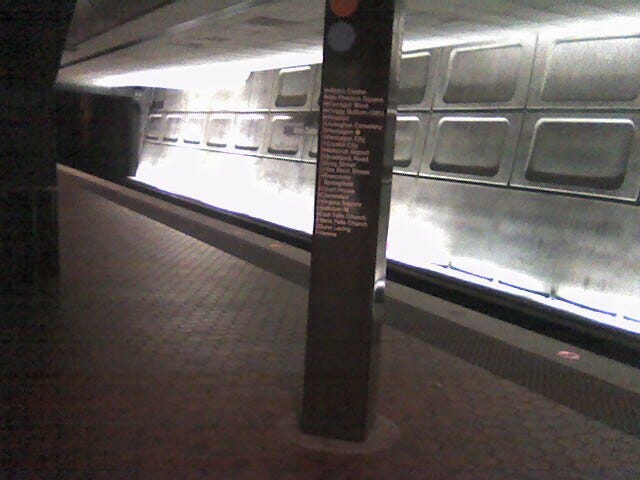Meditations on Metrorail and Maintenance
I recently had the opportunity to ride Washington DC's Metrorail system. I first rode it the year it opened (1976), and as a child of nearby central Maryland, recall taking the Red Line to the Bicentennial Celebration on July 4th on the National Mall (we parked remotely and used the line to get in, I think we walked back to the car). I was 9, and it seemed the future, all modern and sterile.

Now it is the past's version of the future, modern in a post-modern age, dim and decaying, and still sterile. My subjective impressions are such that it is a system I avoid, taking it only from the airport to my hotel when I am in DC for a meeting or conference. From a simply sensory perspective, it makes me feel nauseous in a way that other similarly aged systems (BART, MARTA) never did, much less more modern light rail lines or other older subways (London, New York, Paris). I don't know what it is about the acceleration and braking, the wobble to the left and right, but it is just unsettling. I have not actually lost it on the Metro, but damn I am relieved to get off. It also has a distinct smell, and unlike Bobby Duvall's claim of Napalm, it is not the smell of victory. All cities have characteristic odors. Blindfolded you can often know if you are in Washington, New York, San Francisco, or Minneapolis. My memories of DC are tainted by the parfum d'Metro. The delays, in large part due to a recent crash maintenance and repair program, have not affected me as a non-resident, but I can imagine this would be infuriating to locals.
WMATA Hot-take: Maintenance problem that caused 1 fire 1 day, but didn't for weeks or months before that, is unlikely to cause one tomorrow.
— David M. Levinson (@trnsprtst) March 15, 2016
Maybe we should coin the term "maintenance theater"
— David M. Levinson (@trnsprtst) March 15, 2016
Sure safety first, but one has the impression of Maintenance Theater about the way this was rolled out, shutting the entire system one day, rather than one line a day with appropriate substitute Metrobus service. I suppose it worked as such, and certainly Washingtonians are now resigned to this. It's too bad it couldn't be properly maintained all along, but that is the general problem we historically nomadic humans have, maintenance is not in our collective genetic or cultural memory. We build, we abandon, we move, repeat. Once you live long enough, you see the new futuristic things of your youth fade into decline. Infrastructure, unlike life, does not self-renew. It requires humans to be the hand-maidens who bring about renewal. And in modern human culture we prize the new, not the renewed. Infrastructure generally doesn't get too much attention. When it does, the ribbon-cutting is "above the fold" in newspaper-speak. Catastrophic failures are, in a bad way, too. But the politician always claims credit for the ribbon-cutting and shifts blame for the failure. Changing the culture to prize maintenance and punish the acquisition of new toys until the existing ones are cared for is a shift for the ages. I don't see how it is promulgated, though conferences like The Maintainers and groups liks Strong Towns seem to be trying.

